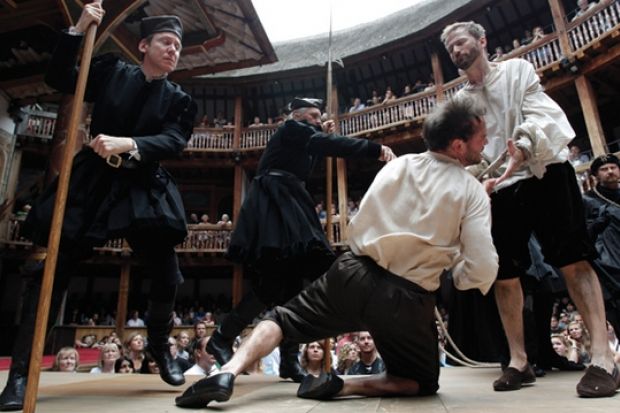Boasting more than 350,000 visitors a year, Shakespeare's Globe theatre is a palpable hit with punters. But perhaps less well known is the theatre's growing reputation in the world of academia and research.
Located on London's bustling South Bank, the Globe has gradually established a varied set of undergraduate and postgraduate courses in collaboration with UK and international universities.
Two PhD scholars are based in the venue's 12,000-book library, rubbing shoulders with actors performing just yards away. But serious scholarship is not merely a happy spin-off from the theatre's main business, insists Patrick Spottiswoode, the Globe's director of education.
In fact, the desire to contribute to academic excellence was central to the vision of Globe founder Sam Wanamaker, the US actor and director who lived in virtual exile in London after he was blacklisted by Hollywood for his communist sympathies. "Sam had a passion to make scholarship public - he wanted to make Shakespeare accessible to all," Mr Spottiswoode said.
Research is in the DNA
"He also thought the Globe could stimulate inquiry. Could it be a catalyst for new scholarship in this field? His great fear was that it would become a Disneyland for Shakespeare, so he needed academic respectability for the project."
Theatre design experts Andrew Gurr, former professor of English at the University of Reading, and the late John Orrell, who was professor of English at the University of Alberta, were crucial in formulating plans for the Globe's reconstruction. Working alongside Mr Wanamaker, the two played a vital role in ensuring the theatre's authenticity.
"Their research determined what the Globe would look like," said Mr Spottiswoode, who took what was intended to be a year out of his PhD at the University of Warwick in 1984 to work for Mr Wanamaker and has been at the Globe ever since. "It's a fine example of scholars having a major impact long before that agenda became so important," he said.
"Their scholarship engaged with the vocational skills of the master builders, and later actors entered the fray. It creates an interesting discourse between disciplines. For instance, humour in Shakespeare is sometimes very hard for academics to grasp, but it's instinctive for actors - they just get it straight away.
"We've also had research interns in our archive whose work has fed back into plays we've staged. It's a two-way transfer of knowledge. Academic research is in our DNA. The Globe's whole construction was as a tool for inquiry, but I hope we can extend the range of research and engage with different areas."
The theatre's university links started with King's College London, two years after the Globe's opening in 1997, with a jointly taught MA in Shakespeare studies. Partnerships with Queen Mary, University of London and Birkbeck, University of London followed, and undergraduates from the US also visit for semester- and year-long courses.
Theatre schools, such as those at the Royal Scottish Academy of Music and Drama, the University of Essex and the University of the Arts London, run acting and directing classes, and students use the Globe's extensive video and audio archive of seminal Shakespearean productions.
A jolly place with a playful approach
Under the direction of Farah Karim-Cooper, the theatre's head of courses and research and a visiting research Fellow at King's, the Globe is expanding its research activities. A new library extension is due to open in 2016 with more than 1,000 Elizabethan documents, and the theatre will publish an outstanding PhD monograph that will also carry a cash prize.
"It's a mini-university on the South Bank," said Mr Spottiswoode, who heads a team of 25 full-time and 60 freelance education staff. "We are now looking to have more fellowships and visiting scholars. I hope we have developed a research culture here. Yes, it's a jolly place to come with a playful approach to scholarship, but the scholars who are coming here to speak are the creme de la creme."
The interplay between the Globe's main education department, which plays host to 120,000 schoolchildren and members of the public each year, and its academic division is also an opportunity for new scholarship. "One of our PhD students was helping an education officer with a production of Hamlet for Southwark schoolchildren, where she had to cut down the play to just one hour," Mr Spottiswoode said.
"I was thinking how lucky the officer was to have this incredibly knowledgeable assistant, but then I thought it was actually the PhD student who was the fortunate one. She had the chance to think about the text in a totally different way."
But can the Globe's model be replicated in other theatres, museums and institutions keen to move into the higher education sphere?
"I think it is starting to happen, but I think it's got to come from a desire from public institutions to extend their own knowledge of their area," Mr Spottiswoode said.
